There is no actual wall around the Wet’suwet’en territory in Canada, leaving the indigenous people that reside there to politely ask that any authorities from the other side of the border to stay on their side of the line. This leads to a number of awkward interactions in “Yintah,” where Howilhkat Frida Huson has set up a cabin just next to the road that leads into the territory to keep watch over it and greets RCMP officials on a regular basis, as well as the increasing number of construction workers associated with the Coastal GasLink pipeline that are eager to connect crude oil through Western Canada, with those not granted permission left to wonder what to do with the chopper they’ve brought or where to congregate when the assumption is that they’ll be let through, albeit with no legal standing to be there.
“Yintah” will screen again at True/False on March 3rd at noon at Jesse Auditorium.




